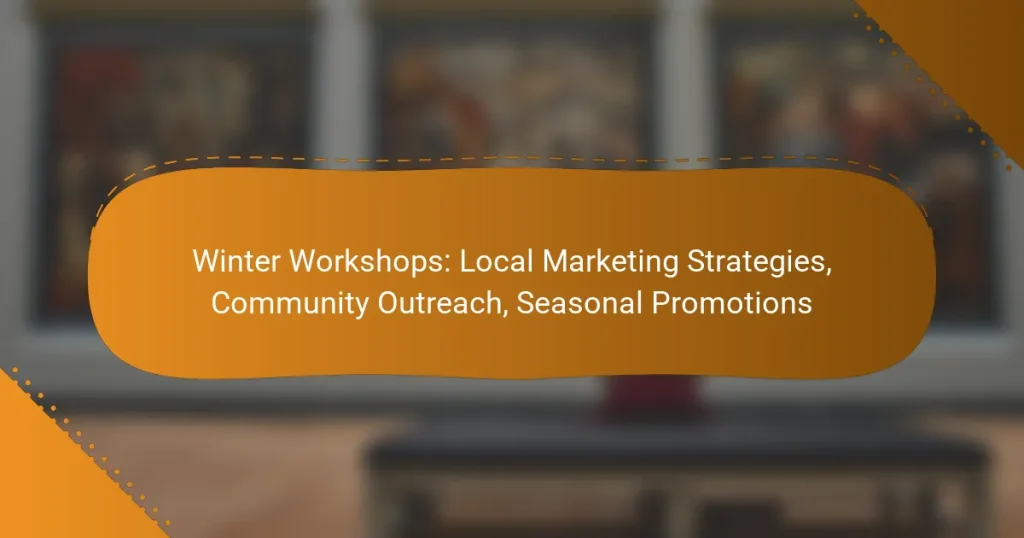Winter workshops present a unique opportunity for local businesses to enhance their marketing strategies while engaging with the community. By offering interactive experiences and seasonal promotions, businesses can attract more participants and foster lasting relationships. Effective outreach efforts not only promote your brand but also strengthen community ties, making these workshops a valuable tool for driving sales and support during the winter months.

How can local businesses leverage winter workshops for marketing?
Local businesses can effectively use winter workshops as a marketing tool by creating engaging experiences that attract community members and promote their brand. These workshops not only foster relationships but also drive seasonal sales through targeted promotions and outreach efforts.
Engaging community members
Winter workshops provide an excellent opportunity for local businesses to connect with their community. By offering hands-on activities, such as crafting, cooking, or wellness sessions, businesses can draw in participants who are interested in learning new skills while enjoying the seasonal atmosphere.
To maximize engagement, consider partnering with local influencers or organizations that align with your brand values. This collaboration can enhance visibility and encourage more community members to participate, creating a sense of belonging and shared experience.
Building brand awareness
Hosting winter workshops allows businesses to showcase their products and services in a practical setting, helping to build brand awareness. Attendees are more likely to remember a brand that provides them with a memorable experience, especially when they can directly interact with the offerings.
Utilize social media platforms to promote these events, sharing photos and testimonials from participants. This not only increases reach but also reinforces the brand’s presence in the community, making it more recognizable and relatable.
Driving seasonal sales
Winter workshops can be a strategic way to drive seasonal sales by incorporating product promotions into the event. For example, offering discounts on items used during the workshop or providing exclusive deals for attendees can incentivize purchases.
Consider creating a limited-time offer or bundle deals that encourage participants to buy more. This approach not only boosts immediate sales but also fosters customer loyalty, as attendees may return for future workshops or recommend your business to others.

What are effective community outreach strategies during winter?
Effective community outreach strategies during winter focus on engaging local residents through events and partnerships. These approaches not only promote your business but also foster a sense of community and support local initiatives.
Hosting local events
Hosting local events can significantly enhance your outreach efforts during the winter months. Consider organizing seasonal gatherings such as holiday markets, winter festivals, or charity drives that encourage community participation.
When planning these events, ensure they are accessible and appealing to a broad audience. Offering free admission or family-friendly activities can attract more attendees and create a welcoming atmosphere.
Promote your event through local media, social media platforms, and community boards to maximize visibility. Collaborating with local vendors or artists can also add value and draw in diverse crowds.
Partnering with local organizations
Partnering with local organizations can amplify your outreach impact during winter. Collaborate with schools, non-profits, or community centers to create programs that benefit both your business and the community.
For instance, consider sponsoring a local sports team or co-hosting a food drive with a nearby charity. These partnerships not only enhance your brand’s reputation but also demonstrate your commitment to local causes.
Be sure to communicate the mutual benefits clearly and maintain a consistent presence in these partnerships. This can lead to long-term relationships that strengthen your community ties and increase your visibility.

What seasonal promotions work best for winter workshops?
Seasonal promotions for winter workshops that are effective include discounted fees, free trial classes, and holiday-themed offerings. These strategies can attract more participants by providing value and enhancing the appeal of your workshops during the winter months.
Discounted workshop fees
Offering discounted workshop fees is a straightforward way to encourage enrollment during the winter season. Consider providing a percentage off the regular price or a flat rate discount, which can appeal to budget-conscious individuals. For example, a 20% discount on a $100 workshop fee could make it more attractive to potential attendees.
When implementing discounts, clearly communicate the limited-time nature of the offer to create urgency. Ensure that the discounted price still covers your costs and maintains the perceived value of the workshop.
Free trial classes
Free trial classes allow potential participants to experience your workshop without any financial commitment, making it an effective promotional strategy. Offering a one-time free session can help individuals gauge the quality of your instruction and the relevance of the content to their interests.
To maximize the impact of free trials, promote them through local community boards, social media, and email newsletters. Make sure to follow up with attendees after the trial to encourage them to sign up for the full workshop series.
Holiday-themed offerings
Creating holiday-themed workshops can attract participants looking for seasonal activities. These offerings might include crafting classes focused on holiday decorations or cooking workshops featuring festive recipes. Tailoring your content to the winter holidays can enhance engagement and draw in a larger audience.
Consider bundling holiday-themed workshops with special promotions, such as group discounts or family packages, to encourage participation. Highlighting these unique offerings in your marketing materials can help differentiate your workshops from others during the busy winter season.

What criteria should businesses consider for winter marketing?
Businesses should focus on understanding their target audience, analyzing local competition, and leveraging seasonal trends to create effective winter marketing strategies. These criteria help tailor promotions and outreach efforts to maximize engagement and sales during the winter months.
Target audience demographics
Identifying the demographics of your target audience is crucial for winter marketing. Consider factors such as age, income level, and lifestyle preferences, as these will influence the types of promotions and messaging that resonate. For instance, families may respond well to holiday-themed events, while young professionals might prefer exclusive winter sales.
Utilize local data to refine your understanding of the community’s demographics. Tools like surveys or social media insights can provide valuable information about your audience’s interests and behaviors during the winter season.
Local competition analysis
Analyzing local competition is essential for developing a competitive edge in winter marketing. Identify key competitors in your area and evaluate their marketing strategies, promotions, and customer engagement tactics. This can reveal gaps in the market that your business can exploit.
Consider conducting a SWOT analysis (Strengths, Weaknesses, Opportunities, Threats) for your competitors. This will help you understand their positioning and allow you to differentiate your offerings effectively. For example, if a competitor is heavily promoting discounts, you might focus on unique experiences or bundled services to attract customers.

How can businesses measure the success of winter marketing strategies?
Businesses can measure the success of winter marketing strategies by tracking key performance indicators such as attendance rates and sales data. These metrics provide insights into customer engagement and overall effectiveness of seasonal promotions.
Tracking attendance rates
Tracking attendance rates is essential for evaluating the impact of winter workshops and events. Businesses should monitor how many participants attend compared to the number of registrations or expected attendees. A higher attendance rate often indicates effective outreach and interest in the event.
To analyze attendance, consider using tools like event registration platforms that provide analytics. For example, if a workshop aimed for 50 attendees but only attracted 30, this could signal a need for improved marketing or a reassessment of the event’s appeal.
Analyzing sales data
Sales data analysis is crucial for understanding the financial impact of winter marketing strategies. Businesses should compare sales figures before, during, and after the winter season to identify trends and spikes related to specific promotions or events. Look for increases in sales volume or average transaction value during this period.
For instance, if a local shop runs a winter promotion and sees a 20% increase in sales compared to the previous month, this indicates a successful strategy. Regularly reviewing sales data can help businesses adjust their marketing tactics and optimize future campaigns.

What tools can assist in planning winter workshops?
Several tools can streamline the planning of winter workshops, enhancing organization and outreach. Event management software and social media marketing platforms are particularly effective in coordinating logistics and promoting events to the community.
Event management software
Event management software simplifies the planning process by providing features for scheduling, registration, and communication. Popular options include platforms like Eventbrite and Cvent, which allow organizers to create event pages, manage ticket sales, and track attendance.
When selecting software, consider factors such as user-friendliness, integration with other tools, and pricing. Many platforms offer free tiers or charge a small fee per ticket sold, making them accessible for local organizations.
Social media marketing platforms
Social media marketing platforms are essential for promoting winter workshops and engaging with the community. Tools like Facebook, Instagram, and Twitter allow you to reach a broad audience through targeted ads and organic posts.
To maximize impact, create a content calendar that includes promotional posts, event reminders, and interactive content like polls or Q&A sessions. Utilize analytics features to track engagement and adjust your strategy based on what resonates most with your audience.

What are the emerging trends in seasonal marketing for 2024?
Emerging trends in seasonal marketing for 2024 focus on personalization, sustainability, and digital engagement. Brands are increasingly leveraging data analytics to tailor their promotions and outreach efforts, while also emphasizing eco-friendly practices to resonate with conscious consumers.
Personalization in Marketing Campaigns
Personalization is becoming essential in seasonal marketing campaigns, as consumers expect tailored experiences. Businesses can utilize customer data to segment their audience and create targeted promotions that reflect individual preferences and behaviors.
For example, a local retailer might send personalized offers to customers based on their past purchases or browsing history. This approach can increase engagement and conversion rates, making marketing efforts more effective.
Sustainability and Eco-Friendly Practices
As consumers grow more environmentally conscious, incorporating sustainability into seasonal marketing is crucial. Brands can highlight eco-friendly products, sustainable sourcing, and green practices in their campaigns to attract like-minded customers.
For instance, a winter workshop could promote locally sourced materials for crafts, emphasizing the reduced carbon footprint. This not only appeals to eco-conscious consumers but also builds brand loyalty.
Digital Engagement and Social Media Strategies
Digital engagement is vital for seasonal marketing, with social media platforms serving as key channels for outreach. Brands should create interactive content, such as polls, contests, or live events, to foster community involvement and enhance visibility.
For example, a business could host a virtual holiday event on social media, encouraging users to share their experiences and tag the brand. This strategy can significantly boost organic reach and engagement during the busy holiday season.

